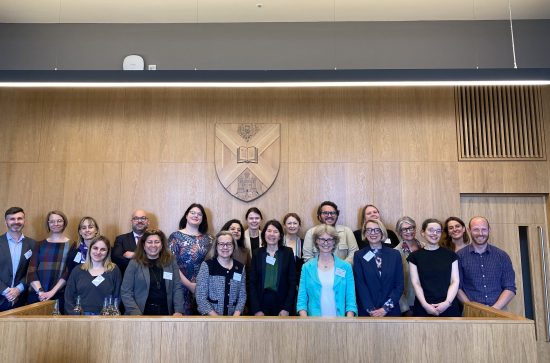
On 30 and 31 May 2024, Maynooth School of Law and Criminology’s Dr Karen Lynch Shally together with Edinburgh Law School’s Dr Simone Lamont-Black, Dr Catherine Pédamon (University of Westminster), and Dr Timothy J. Dodsworth (Newcastle University) hosted the Sustainability in the Food Supply Chain roundtable workshop at Edinburgh Law School’s historical Old College.
Funded by the Society of Legal Scholars and Edinburgh Law School, the workshop brought together over 30 experts from diverse disciplines and backgrounds. The workshop benefited from keynote speeches by Professor Fabrizio Cafaggi, from Italy’s Consiglio di Stato and Ms Jeannette Tramhel, Senior Legal Consultant at UNIDROIT and the roundtables were chaired by experts in the field such as Professor Paola Iamiceli, from the University of Trento, Professor Fiona Smith, from the UK Trade Policy Observatory at the University of Sussex, and Ms Jeannette Tramhel.
The workshop explored the role of law in addressing regulatory challenges and opportunities in food supply chains. It assessed the role of commercial and contract law along with its limitations, actual or perceived, in achieving sustainability and food security. Contributions were made from a broad spectrum of legal and policy arenas, including competition law and corporate law, along with sustainability, food, agriculture, and environmental policy. The discussants covered topics assessing policy coherence with a view to sustainability and food security at national, European Union, and international level. Among the participants providing a regulatory perspective on issues under discussion was Niamh Lenehan, CEO of the recently established An Rialálaí Agraibhia (the Agri Food Regulator). An Rialálaí Agrabhia is an independent Irish authority with a mandate to ensure compliance with unfair trading law and to increase fairness and transparency in the agricultural and food supply chain.
Dr Lynch Shally said: “On behalf of our organising committee we wish to express a very big thank you to all participants who so kindly contributed their time and expertise to the workshop and roundtables. It was a pleasure to see our vision come to fruition and be part of this rich and exciting exchange of knowledge, ideas and perspectives.”
The success of this roundtable provides a stepping stone in building a network of interested persons to enable further research and to create impact links in this area and with the longer-term aim of informing policy and stimulating change in practice.
Sustainability in the Food Supply Chain: Workshop Programme [PDF]
